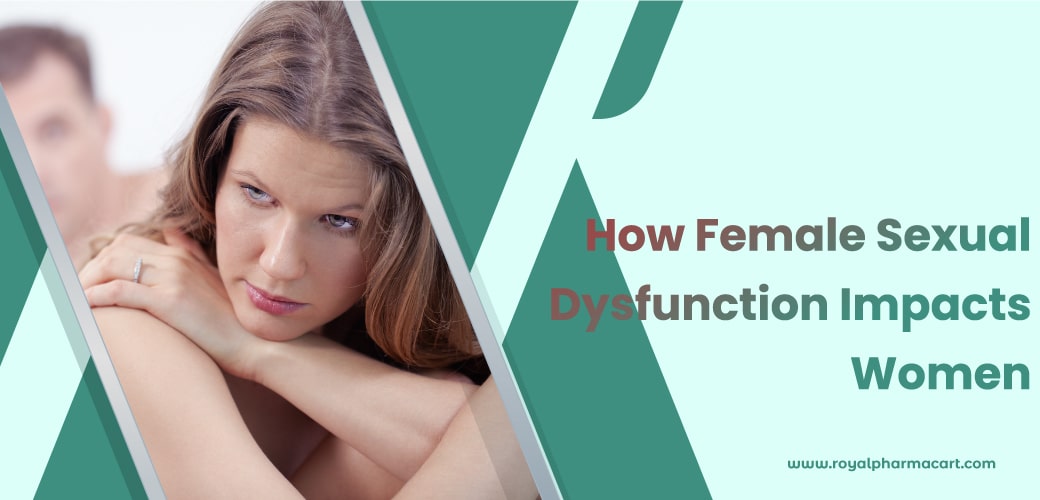Health & Wellness, Personal Care
How Female Sexual Dysfunction Impacts Women
How Female Sexual Dysfunction Impacts Women
Sexual dysfunction in women can manifest itself in various ways. Women may experience pain during sex, low libido, difficulty getting pleasure from sex, and difficulty having an orgasm.
Many women experience problems with sexual function at some point, and some have lifelong difficulties. Female sexual dysfunction can manifest at any point in a woman’s life, affecting specific sexual encounters or all aspects of her sexual life.
Sexual response involves a complex interaction of physiology, emotions, experiences, beliefs, lifestyle and relationships. Discontinuing any element of treatment can impact sexual desire, arousal, or satisfaction, often necessitating a multifaceted approach to treatment.
Symptoms
Symptoms vary depending on the type of sexual dysfunction you are experiencing:
Low sexual desire. The most common female sexual dysfunction involves a lack of sexual interest and desire to have sex.
Sexual arousal disorder. Your libido may be intact, but you have difficulty getting aroused or are unable to become aroused or maintain arousal during sexual activity.
Orgasm disorder. You have persistent or recurring difficulty achieving orgasm after sufficient sexual arousal and continued stimulation.
Sexual pain disorder. You experience pain associated with sexual stimulation or vaginal contact.
When sexual problems are more likely in women
The sexual response cycle is disrupted, or pain is associated with sexual activity when sexual dysfunction is present. American women experience sexual problems in 43% of cases and psychological distress related to sexual problems in 22% of cases. The study suggests that you are more likely to have sexual problems if you are:
- Separated, divorced, widowed or single.
- An uneducated individual.
- Feeling emotionally or physically stressed.
- Your economic situation is deteriorating.
- A feeling of dissatisfaction, physical or emotional.
- Forced or sexually abused.
- Have thyroid problems.
- Dealing with urinary incontinence.
Causes of sexual dysfunction in women
The term “sexual dysfunction” refers to a variety of conditions. Psychological, physical, interpersonal or sociocultural factors can cause sexual dysfunction. Cenforce Pill is a medicine that helps men suffering from erectile dysfunction to get a hard erection. Various options are available; some are Kamagra 100mg and Cenforce 200mg.
Psychological and Social causes
- Being stressed due to work or family obligations
- Having concerns about sexual performance
- depression/anxiety
- Questions related to sexual orientation that remain unresolved
- A history of traumatic sexual or physical experiences
- Body image and self-esteem issues
Physical Causes including:
- Diabetes
- Cardiac disease
- liver disease
- Nephropathy
- Pelvic surgery
- Trauma or injury to the pelvis
- Nervous system disorders
- Side effects of medications
Hormonal
Lower estrogen levels after menopause can lead to changes in genital tissues and sexual responsiveness. Decreased estrogen leads to decreased blood flow to the pelvic area, which can result in decreased genital sensation, as well as a longer time to develop arousal and reach orgasm.
The vaginal mucosa also becomes thinner and less elastic, especially if you are not sexually active. These factors may contribute to painful intercourse, also known as dyspareunia. Sexual desire also decreases when hormone levels decrease.
Hormone levels in the body also change after childbirth and during breastfeeding, which can lead to vaginal dryness and affect the desire to have sex.
Women are more likely to have sexual desire problems due to a lack of sexual desire. It is important to understand that the response to female sexual dysfunction is very individual and that she will experience varying degrees of it at different times in her life.
Risk factors
Certain factors can increase the risk of sexual dysfunction:
- Depression or Anxiety
- Diseases of the heart and blood vessels
- Neurological conditions, such as spinal cord injury or multiple sclerosis
- Gynecologic conditions, such as vulvovaginal atrophy, infections, or lichen sclerosus
- Certain medications, such as antidepressants or blood pressure medications
- Emotional or psychological stress, especially regarding the relationship with your partner
- A story of sexual abuse
Other Effects of Sexual Dysfunction on Women
Pain related to sexual activity
A person with dyspareunia experiences recurring or persistent pain during sexual intercourse. The cause can be due to several factors, including infections, hormonal imbalances, vaginal dryness or even pelvic floor disorders. If you experience pain during sex, you may develop anxiety, avoid engaging in sexual activities, and have strained relationships.
Orgasm disorders
It is common for women who suffer from orgasm disorders to have difficulty reaching orgasm or to have very weak or delayed orgasms. As a result, sexual satisfaction and self-esteem can suffer, as can feelings of frustration, inadequacy, and disappointment. Vidalista 40mg medicine can help you get a hard erection for a prolonged period. Its other doses are Vidalista 60.
A woman diagnosed with sexual dysfunction should seek treatment
Health care providers will attempt to rule out medical causes of sexual dysfunction by performing a thorough medical history and physical examination, including a vulvar and pelvic exam and blood tests.
Because sexual problems are biopsychosocial, even when a biological cause is identified, a psychological impact can be significant and psychological counseling may be necessary.
You should tell your doctor if you have any of the following conditions that may significantly affect your sexual function, either physically or psychologically:
- Diabetes, heart disease, kidney disease and liver disease are chronic diseases.
- Cancer
- Pregnancy
- Menopause
- Infertility
- Substance abuse
Final words
At some point in their lives, most women experience sexual dysfunction, including difficulty becoming aroused. Treatments are available for FSIAD, although it can sometimes feel isolating and frustrating.
Consult your doctor to rule out any underlying physical or psychological conditions contributing to your symptoms. Alternatively, you or your partner may wish to consult a sex therapist.
There are many causes and manifestations of FSD, making it a complex problem. A gynecologist, urologist or sexologist is the most appropriate healthcare provider for women experiencing sexual difficulties. FSD can be treated with counseling, medications, hormone therapy, and lifestyle changes depending on the underlying cause.

